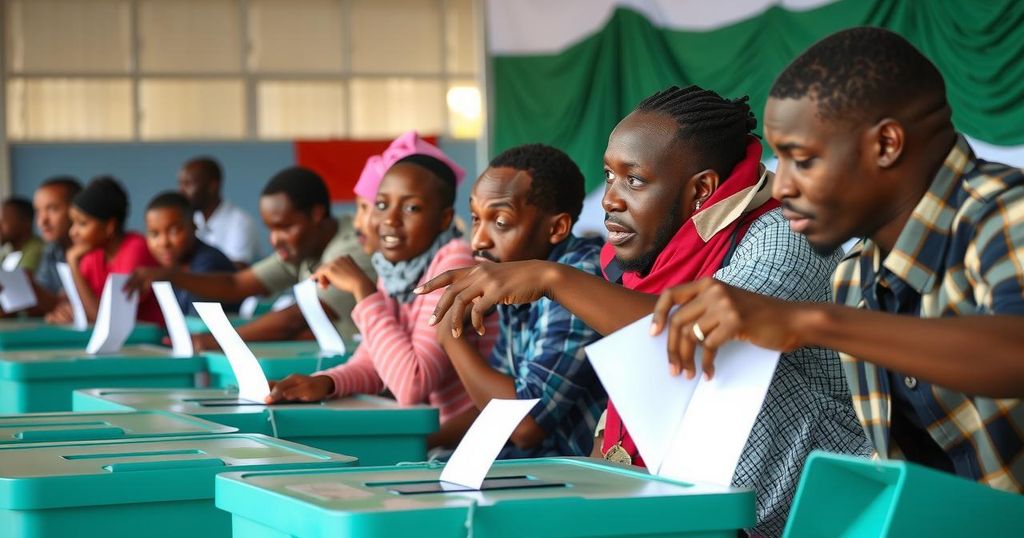World news
2024 ELECTIONS, AFRICA, AFRICA CENTER FOR STRATEGIC STUDIES, AHMED ABDALLAH SAMBI, AP, APNEWS, ASSOUMANI, AZ, AZALI ASSOUMANI, COM, COMOROS, CORRUPTION, ELECTIONS, EUROPE, FOR THE RENEWAL OF THE COMOROS, FRANCE, GOVERNANCE, GRANDE COMORE, INDIAN OCEAN, MADAGASCAR, MAYOTTE, MITSOUDJE, MITSOUDJÉ, MORONI, PRESIDENTIAL ELECTION, U. S, VOTER TURNOUT
David O'Sullivan
0 Comments
Comoros Parliamentary Election Witnesses Opposition Boycotts Amidst Political Tensions
The parliamentary elections in Comoros faced a boycott by several opposition parties due to accusations against President Azali Assoumani regarding authoritarianism and electoral integrity. Approximately 330,000 citizens registered to vote, but low turnout is expected. Assoumani’s presidency has been marked by allegations of political repression and fraudulent elections, raising concerns about the democratic process in the nation affected by a history of coups and instability.
On Sunday, Comoros conducted its parliamentary elections, amidst a boycott from several opposition groups. These parties, led by figures such as former President Ahmed Abdallah Sambi and his Juwa Party, have expressed serious allegations against President Azali Assoumani and his ruling coalition, citing concerns of authoritarianism and electoral integrity. Approximately 330,000 of the 850,000 residents of Comoros were registered to vote; however, opposition leaders anticipated a significantly low voter turnout due to widespread dissatisfaction with the electoral process.
The elections will determine the makeup of the 33-member legislature, with results expected next week from the national electoral commission. In the 2020 parliamentary election, Assoumani’s party secured 20 of the contested 24 seats, which opposition factions condemned as a sham. Violent protests erupted following last year’s presidential election, also deemed fraudulent by opposition groups. Despite the tumult, Assoumani participated in the vote in his hometown of Mitsoudjé on Grande Comore, the largest island in the archipelago.
Comoros, an Indian Ocean archipelago, has a turbulent political history marked by military coups since its independence from France in 1975. President Assoumani, a former military officer, first seized power in 1999 and has since maintained authority through multiple elections, recently altering the constitution to extend his rule. The Africa Center for Strategic Studies has noted that his administration has exhibited increased political repression coupled with non-competitive elections.
Despite adverse weather conditions posed by Tropical Cyclone Dikeledi, officials confirmed that the elections would proceed as planned. The voter turnout and overall electoral credibility will be scrutinized as international observers monitor the situation.
The parliamentary elections in Comoros occur against a backdrop of political instability and repeated accusations of electoral malpractice. Under President Azali Assoumani, who has ruled since returning to power in 2016 following a constitution amendment to evade term limits, the country has experienced significant turmoil and unrest. Since gaining independence from France in 1975, Comoros has suffered from numerous military coups, shaping its current political climate. The lack of a credible electoral process has led to boycotts by opposition parties, indicating a deep-seated disillusionment among segments of the populace regarding their representation and democratic governance.
The recent parliamentary elections in Comoros highlight the ongoing tensions between the ruling party and opposition factions, illustrating a struggle over democratic practices in the archipelago. While President Assoumani’s party seeks to consolidate its power, the boycotts and anticipated low voter turnout represent a broader discontent with the electoral process. As the political landscape continues to evolve in Comoros, the integrity of its elections remains a critical concern for both local and international observers.
Original Source: www.seattletimes.com




Post Comment